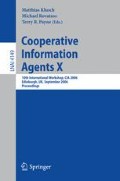Abstract
Multi-agent systems are based upon cooperative interactions between agents, in which agents provide information, resources and services to others. Typically agents are autonomous and self-interested, meaning that they have control over their own actions, and that they seek to maximise their own goal achievement, rather than necessarily acting in a benevolent or socially-oriented manner. Consequently, interaction outcomes are uncertain since commitments can be broken and the actual services rendered may differ from expectations in terms of cost or quality. Cooperation is, therefore, an uncertain interaction, that has an inherent risk of failure or reduced performance. In this paper we show how agents can use trust to manage this risk. Our approach uses fuzzy logic to represent trust and allow agents to reason with uncertain and imprecise information regarding others’ trustworthiness.
Access this chapter
Tax calculation will be finalised at checkout
Purchases are for personal use only
Preview
Unable to display preview. Download preview PDF.
References
Castelfranchi, C., Falcone, R.: Principles of trust for MAS: Cognitive anatomy, social importance, and quantification. In: Proceedings of the Third International Conference on Multi-Agent Systems (ICMAS 1998), Paris, France, pp. 72–79 (1998)
Gambetta, D.: Can we trust trust? In: Gambetta, D. (ed.) Trust: Making and Breaking Cooperative Relations, pp. 213–237. Basil Blackwell, Malden (1988)
Griffiths, N.: Trust: Challenges and opportunities. AgentLink News 19, 9–11 (2005)
Griffiths, N.: Fuzzy trust for peer-to-peer systems. In: Proceedings of the P2P Data and Knowledge Sharing Workshop (P2P/DAKS 2006) (to appear)
Griffiths, N., Chao, K.-M.: Experience-based trust: Enabling effective resource selection in a grid environment. In: Herrmann, P., Issarny, V., Shiu, S.C.K. (eds.) iTrust 2005. LNCS, vol. 3477, pp. 240–255. Springer, Heidelberg (2005)
Luhmann, N.: Familiarity, confidence, trust: Problems and alternatives. In: Gambetta, D. (ed.) Trust: Making and Breaking Cooperative Relations, pp. 94–107. Basil Blackwell, Malden (1988)
Mamdani, E.H., Assilian, S.: An experiment in linguistic synthesis with a fuzzy logic controller. International Journal of Man-Machine Studies 7(1), 1–13 (1975)
Manchala, D.W.: E-commerce trust metrics and models. IEEE Internet Computing 4(2), 36–44 (2000)
Marsh, S., Dibben, M.R.: Trust, untrust, distrust and mistrust — an exploration of the dark(er) side. In: Herrmann, P., Issarny, V., Shiu, S.C.K. (eds.) iTrust 2005. LNCS, vol. 3477, pp. 17–33. Springer, Heidelberg (2005)
NRC Institute for Information Technology. The FuzzyJ toolkit (2006), www.iit.nrc.ca/IR_public/fuzzy/fuzzyJToolkit2.html
Ramchurn, S.D., Sierra, C., Godo, L., Jennings, N.R.: Devising a trust model for multi-agent interactions using confidence and reputation. Artificial Intelligence 18(9–10), 833–852 (2004)
Ross, T.J.: Fuzzy Logic With Engineering Applications, 2nd edn. John Wiley & Sons, Chichester (2004)
Sabater, J., Sierra, C.: REGRET: A reputation model for gregarious societies. In: Proceedings of the First International Joint Conference on Autonomous Agents in Multi-Agent Systems (AAMAS 2002), pp. 475–482 (2002)
Song, S., Hwang, K., Zhou, R., Kwok, Y.-K.: Trusted P2P transactions with fuzzy reputation aggregation. IEEE Internet Computing 9(6), 24–34 (2005)
Stakhanova, N., Basu, S., Wong, J., Stakhanov, O.: Trust framework for P2P networks using peer-profile based anomaly technique. In: Proceedings of the Second International Workshop on Security in Distributed Computing Systems, pp. 203–209 (2005)
Xiong, L., Liu, L.: PeerTrust: Supporting reputation-based trust in peer-to-peer communities. IEEE Transactions on Knowledge and Data Engineering 16(7), 843–857 (2004)
Zadeh, L.A.: A fuzzy-set-theoretic interpretation of linguistic hedges. Journal of Cybernetics 2(3), 4–34 (1972)
Author information
Authors and Affiliations
Editor information
Editors and Affiliations
Rights and permissions
Copyright information
© 2006 Springer-Verlag Berlin Heidelberg
About this paper
Cite this paper
Griffiths, N. (2006). A Fuzzy Approach to Reasoning with Trust, Distrust and Insufficient Trust. In: Klusch, M., Rovatsos, M., Payne, T.R. (eds) Cooperative Information Agents X. CIA 2006. Lecture Notes in Computer Science(), vol 4149. Springer, Berlin, Heidelberg. https://doi.org/10.1007/11839354_26
Download citation
DOI: https://doi.org/10.1007/11839354_26
Publisher Name: Springer, Berlin, Heidelberg
Print ISBN: 978-3-540-38569-1
Online ISBN: 978-3-540-38570-7
eBook Packages: Computer ScienceComputer Science (R0)

